
awesome-openvino
A curated list of OpenVINO based AI projects
Stars: 87
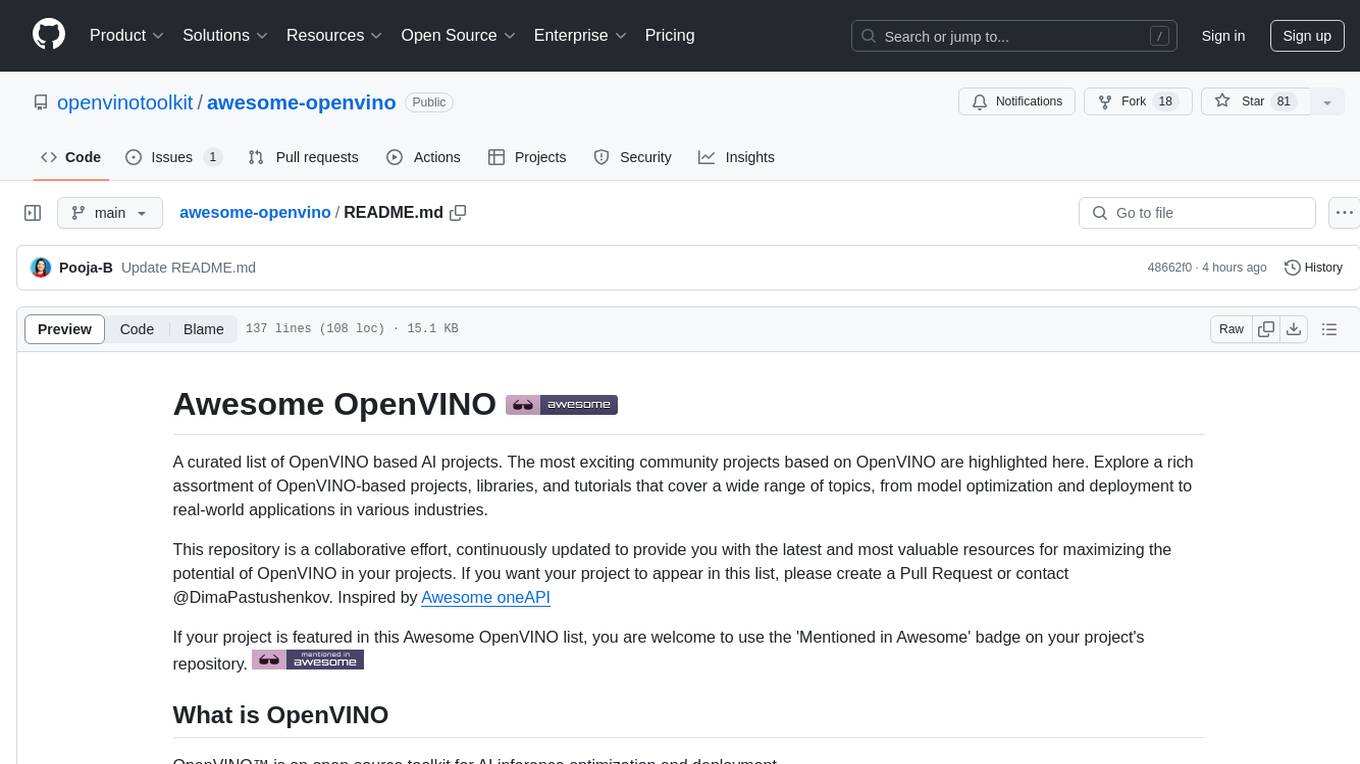
Awesome OpenVINO is a curated list of AI projects based on the OpenVINO toolkit, offering a rich assortment of projects, libraries, and tutorials covering various topics like model optimization, deployment, and real-world applications across industries. It serves as a valuable resource continuously updated to maximize the potential of OpenVINO in projects, featuring projects like Stable Diffusion web UI, Visioncom, FastSD CPU, OpenVINO AI Plugins for GIMP, and more.
README:
A curated list of OpenVINO based AI projects. The most exciting community projects based on OpenVINO are highlighted here. Explore a rich assortment of OpenVINO-based projects, libraries, and tutorials that cover a wide range of topics, from model optimization and deployment to real-world applications in various industries.
This repository is a collaborative effort, continuously updated to provide you with the latest and most valuable resources for maximizing the potential of OpenVINO in your projects. If you want your project to appear in this list, please create a Pull Request or contact @DimaPastushenkov. Inspired by Awesome oneAPI
If your project is featured in this Awesome OpenVINO list, you are welcome to use the 'Mentioned in Awesome' badge on your project's repository.
OpenVINO™ is an open-source toolkit for AI inference optimization and deployment.
- Enhances deep learning performance in computer vision, automatic speech recognition, natural language processing, and other common tasks.
- Utilize models trained with popular frameworks such as TensorFlow and PyTorch while efficiently reducing resource demands.
- Deploy seamlessly across a spectrum of Intel® platforms, spanning from edge to cloud.
-
OpenVINO GitHub repo.
-
To download OpenVINO toolkit, go here.
-
A collection of ready-to-run Jupyter notebooks for learning and experimenting with the OpenVINO™ toolkit- OpenVINO Notebooks.
- Generative AI
- AI Computer Vision
- AI Audio
- OpenVINO API extentions
- Natural Language Processing
- Multimodal projects
- Miscellaneous
- Educational
- Stable Diffusion web UI - This is a repository for a browser interface based on Gradio library for Stable Diffusion
- stable_diffusion.openvino - This GitHub project provides an implementation of text-to-image generation using stable diffusion on Intel CPU or GPU. It requires Python 3.9.0 and is compatible with OpenVINO.
- Fast SD - FastSD CPU is a faster version of Stable Diffusion on CPU. Based on Latent Consistency Models and Adversarial Diffusion Distillation.Read blog post about Fast Stable Diffusion on CPU using FastSD and OpenVINO.
- OpenVINO™ AI Plugins for GIMP - Provides a set of OpenVINO based plugins that add AI features to GIMP (GNU IMAGE MANIPULATION PROGRAM)
- OpenVINO Code - VSCode extension for AI code completion with OpenVINO - VSCode extension for helping developers writing code with AI code assistant.
- Enhancing Customer Service with Real-Time Sentiment Analysis: Leveraging LLMs and OpenVINO for Instant Emotional Insights - The integration of LLMs with sentiment analysis models, further optimised by OpenVINO.
- OV_SD_CPP - The pure C++ text-to-image pipeline, driven by the OpenVINO native API for Stable Diffusion v1.5 with LMS Discrete Scheduler.
- QuickStyle - A simple stylizing app utilizing OpenVINO to stylize common objects in images.
- QuickPainter - A simple inpainting app utilizing OpenVINO to remove common objects from images.
- BlurAnything - An adaptation of the excellent Track Anything project which is in turn based on Meta's Segment Anything and XMem.
- Stable Diffusion 2.1 on Intel ARC - A simple and easy-to-use demo to run Stable Diffusion 2.1 for Intel ARC graphics card based on OpenVINO.
- AI Video Builder - Make videos with AI images from YouTube videos.
-
VisionGuard - A desktop application designed for AI PCs to combat eye strain through real-time gaze tracking, developed during GSoC 2024 under the OpenVINO Toolkit. Built on OpenVINO's gaze estimation demo, VisionGuard offers customizable break reminders, screen time analytics, and multi-device support (CPU/GPU/NPU). It features an intuitive UI with system tray integration, leveraging OpenVINO, Qt, and OpenCV for efficient, privacy-focused local processing.
-
Visioncom Visioncom is based on open_model_zoo project demo, the assisted communication system employs advanced computer vision technologies, using the OpenCV and OpenVINO libraries, to provide an interactive solution for patients with Amyotrophic Lateral Sclerosis (ALS).
-
BMW-IntelOpenVINO-Detection-Inference-API - This is a repository for an object detection inference API using OpenVINO, supporting both Windows and Linux operating systems
-
yolov5_export_cpu - The project provides documentation on exporting YOLOv5 models for fast CPU inference using Intel's OpenVINO framework
-
LidarObjectDetection-PointPillars (C++ based, requires AI toolkit and OpenVINO). demonstrates how to perform 3D object detection and classification using input data (point cloud) from a LIDAR sensor.
-
Pedestrian fall detection - Pedestrian fall detection. Deploying PP-Human based on OpenVINO C # API
-
OpenVINO Tennis Posture - Deciphering Tennis Posture with Artificial Intelligence
-
Cigarette Detection - The project begins by YOLOv8-pose detecting human body positions and extracting skeletal information from images. Based on the skeletal poses, it assesses the elbow angles and the distance between hands and mouths for each individual. If successful, the RTDETR model is employed to detect cigarettes at the mouth zone.
-
FastSAM_Awesome_OpenVINO - The Fast Segment Anything Model(FastSAM) is a CNN Segment Anything Model trained by only 2% of the SA-1B dataset published by SAM authors. The FastSAM achieve a comparable performance with the SAM method at 50× higher run-time speed.
-
Computer Vision Models As Service - implements different Computer Vision Deep Learning Models as a service.
-
Dance-with: Dance with your friends with the right pose! - Dance-with corrects your dance posture using multi-person OpenPose, 2D pose estimation Deep Learning model.
-
Target-Person-Tracking-System - Integration of face recognition and person tracking.
-
Metin2 Bot - bots for video game Metin2.
-
Machine control - industrial machine surveillance system designed to help increase efficiency of processes.
-
MeetingCam - Run your AI and CV algorithms in online meetings such as Zoom, Meets or Teams!
-
Virtual-Tryon - Use AI to try on clothes with your pictures.
-
DepthAI Experiments - A collections of projects done with DepthAI.
-
Project Babble - Mouth tracking project designed to work with any existing VR headset.
-
Group Pose - A Simple Baseline for End-to-End Multi-person Pose Estimation.
-
Frigate - NVR With Realtime Object Detection for IP Cameras.
-
CGD OpenVINO Demo - Efficient Inference and Quantization of CGD for Image Retrieval.
-
Risk package detection - Threat Detection and Unattended Baggage Detection with Associated Person Tracking.
-
YOLOv7-Intel - Object Detection For Autonomous Vehicles.
-
Cerberus - Dog Breed Classification and Body Localization.
-
Criminal Activity recognition - Criminal Activity Video Surveillance.
-
RapidOCR on OpenVINO GPU - A modified verison of RapidOCR to support OpenVINO GPU.
-
Yolov9 with OpenVINO - C++ and python implementation of YOLOv9 using OpenVINO
-
OpenVINO-Deploy - A repository showcasing the deployment of popular object detection AI algorithms using the OpenVINO C++ API for efficient inference.
-
Clip-Chinese - Chinese image-text similarity matching tasks, leverage OpenVINO and the Towhee embedding library.
- OpenVINO™ C# API
- OpenVINO Java API
- OpenVINO LabVIEW API
- OpenVINO.net
- OpenVINO-rs
- OpenVINO-GO Client - The end goal is to utilize a Go client to facilitate user-friendly batch processing of molecular data, interfacing with a Flask server that employs OpenVINO for optimized lipophilicity predictions and molecular visualization
- Japanese chatbot Youri - LLM Japanese chatbot demo program using Intel OpenVINO toolkit.
- OpenVINO GPT-Neo - a port of GPT-Neo that uses OpenVINO.
- Resume-Based Interview Preparation Tool - The Resume-Based Interview Preparation Tool is a software application designed to streamline the interview process by helping interviewers generate relevant and meaningful questions based on a candidate's resume or portfolio page.
- Scene Explorer for kids - Integration of a chat bot with an object detection algorithm.
- Indoor Care Chatbot - An Elderly Indoor Care Chatbot with an object detection algorithm.
- SA2 - Vision-Oriented MultiModal AI.
- OpenVINO Support This initiative generated openVINO compatibility with the openSUSE Linux platform. Because dependencies were added to tools and libraries for software development using C/C++ and other compilation directives for the programming language.
- NTUST Edge AI 2023 Artificial Intelligence and Edge Computing Practice - Educational meterials about AI and Edge Computing Practice GNU IMAGE MANIPULATION PROGRAM
-
JAX: Artificial Intelligence for everyone. - JAX (Just an Artificial Intelligence Extended) is an optimized version of the openSUSE Linux image to work with openVINO. This platform was designed to facilitate the access and development of AI applications.
-
Shared Memory for AI inference - Shared memory interface between OpenVINO and CODESYS. It allows to exchange variable between Control Application, written in IEC and OpenVINO Application, which performs inference
-
webnn-native- WebNN Native is an implementation of the Web Neural Network API, providing building blocks, headers, and backends for ML platforms including DirectML, OpenVINO, and XNNPACK.
-
NVIDIA GPU Plugin - allows to perform deep neural networks inference on NVIDIA GPUs using CUDA, using OpenVINO API.
-
Token Merging for Stable Diffusion running with OpenVINO - An OpenVINO adopted version of Token Merging method.
-
Drug Discovery “Lipophilicity” using OpenVINO toolkit- Finding Lipophilicity of peptides, proteins and molecules.
-
OpenVINO Quantization- Image Quantization Classification using STL 10 Dataset.
-
who_what_benchmark - Simple and quick accuracy test for compressed, quantized, pruned, distilled LLMs from NNCF, Bitsandbytes, GPTQ, and BigDL-LLM.
-
OpenVINO with Docker - Dockerizing OpenVINO applications.
-
OpenVINO AICG Samples - A collection of samples for NLP and Image Generation.
-
OpenVINO Model Server k8s Terraform - Deploying Kubernetes cluster via Terraform as well as deploying and hosting a OpenVINO Model Server on it.
-
Application of Vision Language Models with ROS 2 - Dives into vision-language models for Robotics applications using ROS 2 and Intel OpenVINO toolkit.
See Awesome oneAPI for leading oneAPI and SYCL projects across diverse industries.
OpenVINO takes advantage of the discrete GPUs using Intel oneAPI, an open programming model for multiarchitecture programming. The oneAPI-samples repository demonstrates the performance and productivity offered by Intel oneAPI and its toolkits such as oneDNN in a multi-architecture environment.
For Tasks:
Click tags to check more tools for each tasksFor Jobs:
Alternative AI tools for awesome-openvino
Similar Open Source Tools

awesome-openvino
Awesome OpenVINO is a curated list of AI projects based on the OpenVINO toolkit, offering a rich assortment of projects, libraries, and tutorials covering various topics like model optimization, deployment, and real-world applications across industries. It serves as a valuable resource continuously updated to maximize the potential of OpenVINO in projects, featuring projects like Stable Diffusion web UI, Visioncom, FastSD CPU, OpenVINO AI Plugins for GIMP, and more.

llms-tools
The 'llms-tools' repository is a comprehensive collection of AI tools, open-source projects, and research related to Large Language Models (LLMs) and Chatbots. It covers a wide range of topics such as AI in various domains, open-source models, chats & assistants, visual language models, evaluation tools, libraries, devices, income models, text-to-image, computer vision, audio & speech, code & math, games, robotics, typography, bio & med, military, climate, finance, and presentation. The repository provides valuable resources for researchers, developers, and enthusiasts interested in exploring the capabilities of LLMs and related technologies.
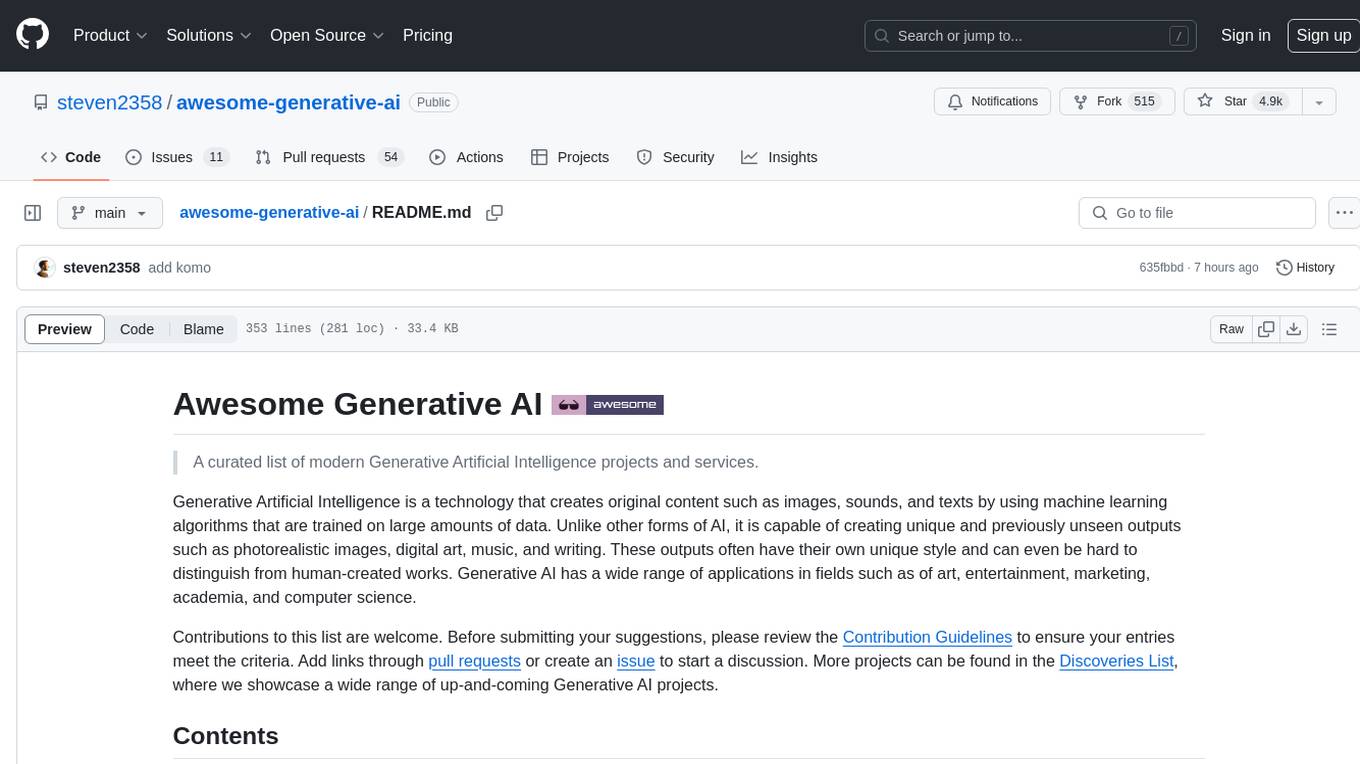
awesome-generative-ai
Awesome Generative AI is a curated list of modern Generative Artificial Intelligence projects and services. Generative AI technology creates original content like images, sounds, and texts using machine learning algorithms trained on large data sets. It can produce unique and realistic outputs such as photorealistic images, digital art, music, and writing. The repo covers a wide range of applications in art, entertainment, marketing, academia, and computer science.

learn-modern-ai-python
This repository is part of the Certified Agentic & Robotic AI Engineer program, covering the first quarter of the course work. It focuses on Modern AI Python Programming, emphasizing static typing for robust and scalable AI development. The course includes modules on Python fundamentals, object-oriented programming, advanced Python concepts, AI-assisted Python programming, web application basics with Python, and the future of Python in AI. Upon completion, students will be able to write proficient Modern Python code, apply OOP principles, implement asynchronous programming, utilize AI-powered tools, develop basic web applications, and understand the future directions of Python in AI.
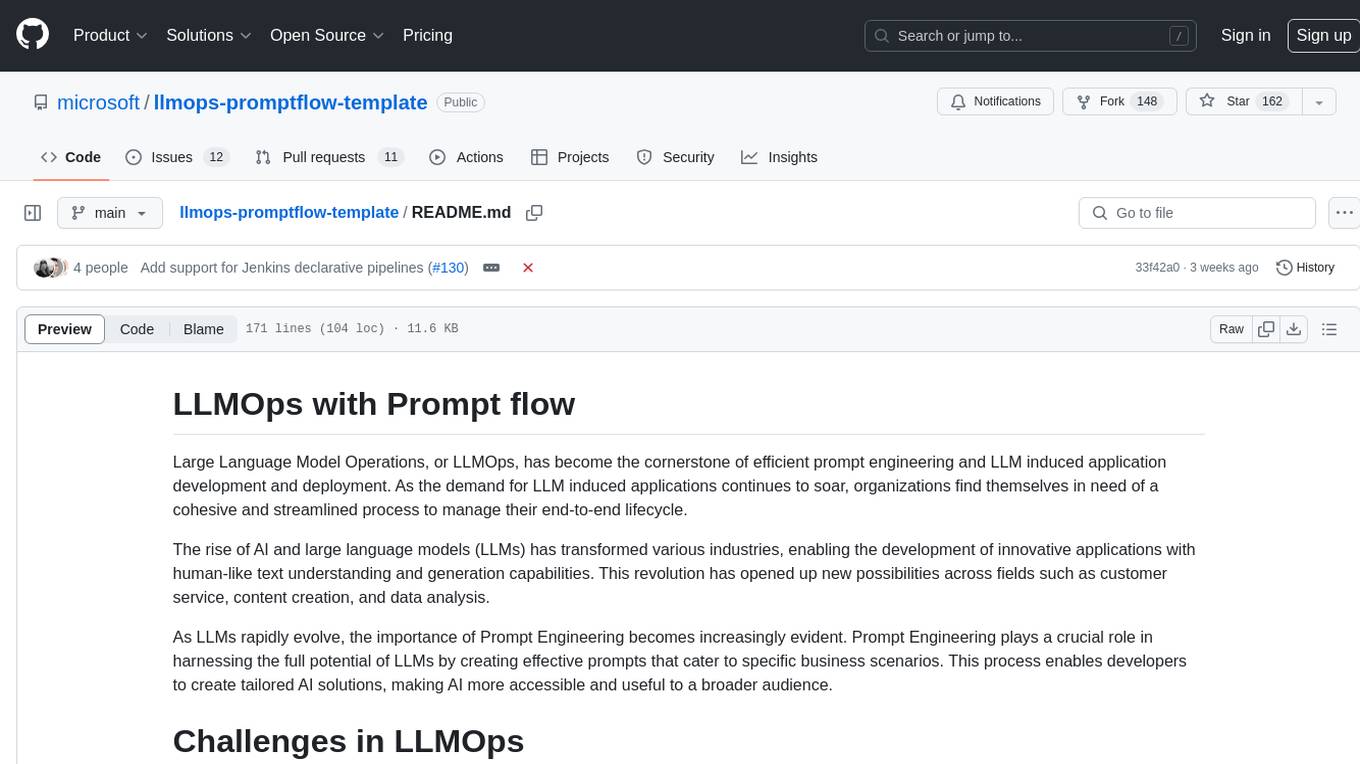
llmops-promptflow-template
LLMOps with Prompt flow is a template and guidance for building LLM-infused apps using Prompt flow. It provides centralized code hosting, lifecycle management, variant and hyperparameter experimentation, A/B deployment, many-to-many dataset/flow relationships, multiple deployment targets, comprehensive reporting, BYOF capabilities, configuration-based development, local prompt experimentation and evaluation, endpoint testing, and optional Human-in-loop validation. The tool is customizable to suit various application needs.
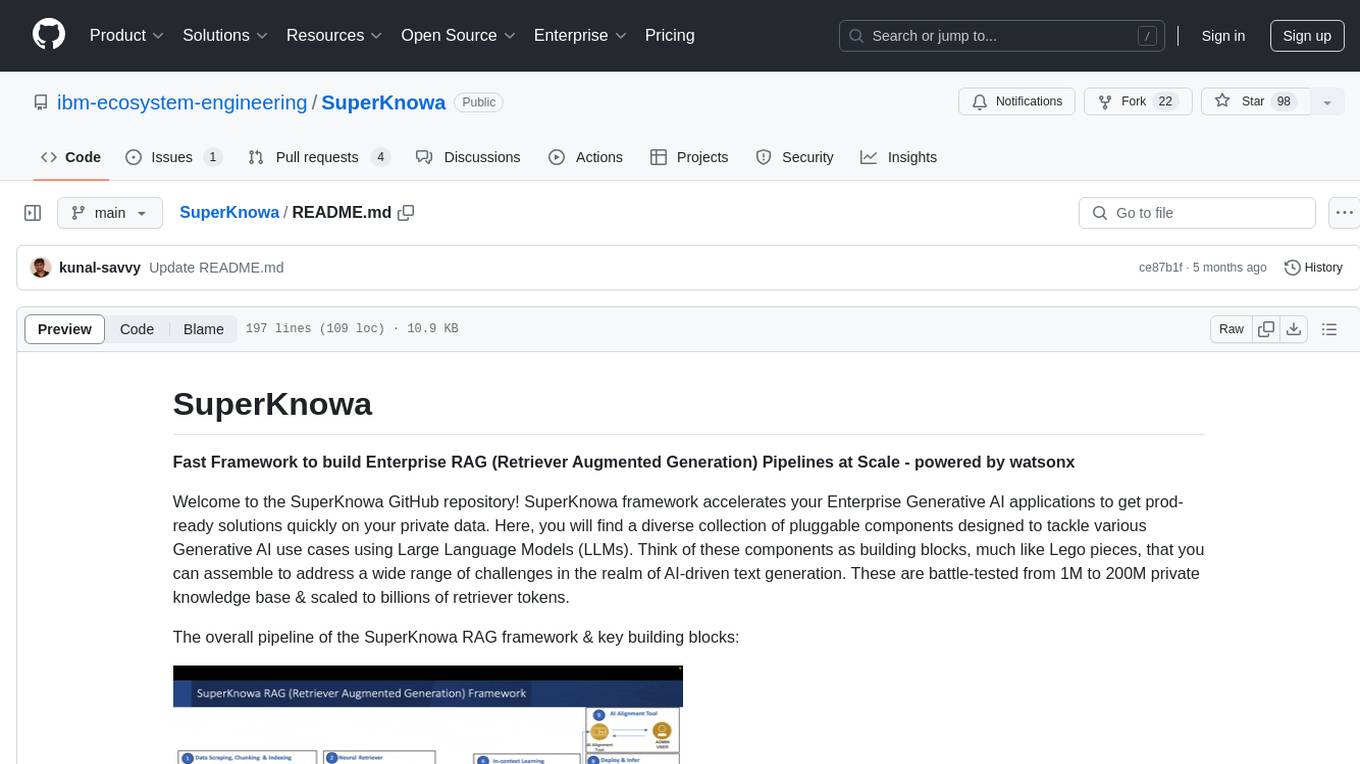
SuperKnowa
SuperKnowa is a fast framework to build Enterprise RAG (Retriever Augmented Generation) Pipelines at Scale, powered by watsonx. It accelerates Enterprise Generative AI applications to get prod-ready solutions quickly on private data. The framework provides pluggable components for tackling various Generative AI use cases using Large Language Models (LLMs), allowing users to assemble building blocks to address challenges in AI-driven text generation. SuperKnowa is battle-tested from 1M to 200M private knowledge base & scaled to billions of retriever tokens.

nlp-llms-resources
The 'nlp-llms-resources' repository is a comprehensive resource list for Natural Language Processing (NLP) and Large Language Models (LLMs). It covers a wide range of topics including traditional NLP datasets, data acquisition, libraries for NLP, neural networks, sentiment analysis, optical character recognition, information extraction, semantics, topic modeling, multilingual NLP, domain-specific LLMs, vector databases, ethics, costing, books, courses, surveys, aggregators, newsletters, papers, conferences, and societies. The repository provides valuable information and resources for individuals interested in NLP and LLMs.
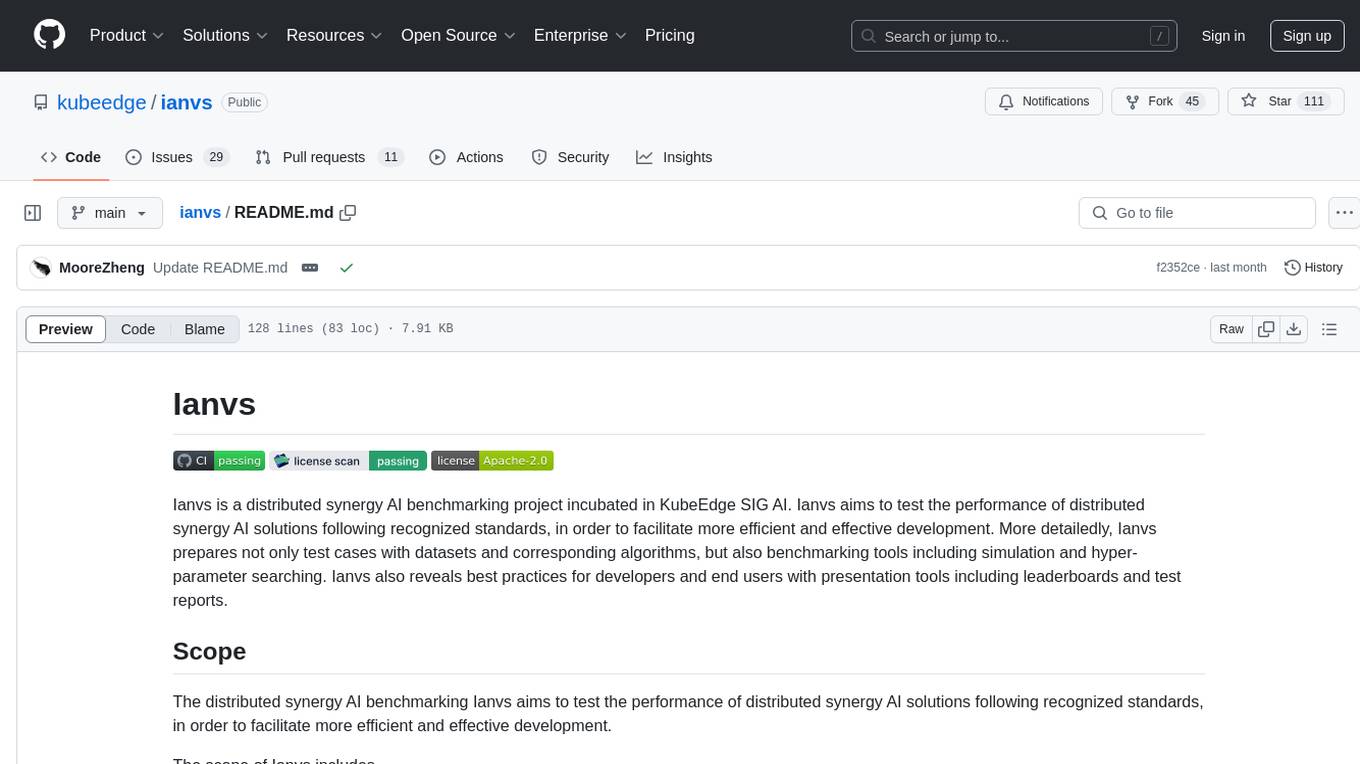
ianvs
Ianvs is a distributed synergy AI benchmarking project incubated in KubeEdge SIG AI. It aims to test the performance of distributed synergy AI solutions following recognized standards, providing end-to-end benchmark toolkits, test environment management tools, test case control tools, and benchmark presentation tools. It also collaborates with other organizations to establish comprehensive benchmarks and related applications. The architecture includes critical components like Test Environment Manager, Test Case Controller, Generation Assistant, Simulation Controller, and Story Manager. Ianvs documentation covers quick start, guides, dataset descriptions, algorithms, user interfaces, stories, and roadmap.

awesome-ai-tools
Awesome AI Tools is a curated list of popular tools and resources for artificial intelligence enthusiasts. It includes a wide range of tools such as machine learning libraries, deep learning frameworks, data visualization tools, and natural language processing resources. Whether you are a beginner or an experienced AI practitioner, this repository aims to provide you with a comprehensive collection of tools to enhance your AI projects and research. Explore the list to discover new tools, stay updated with the latest advancements in AI technology, and find the right resources to support your AI endeavors.
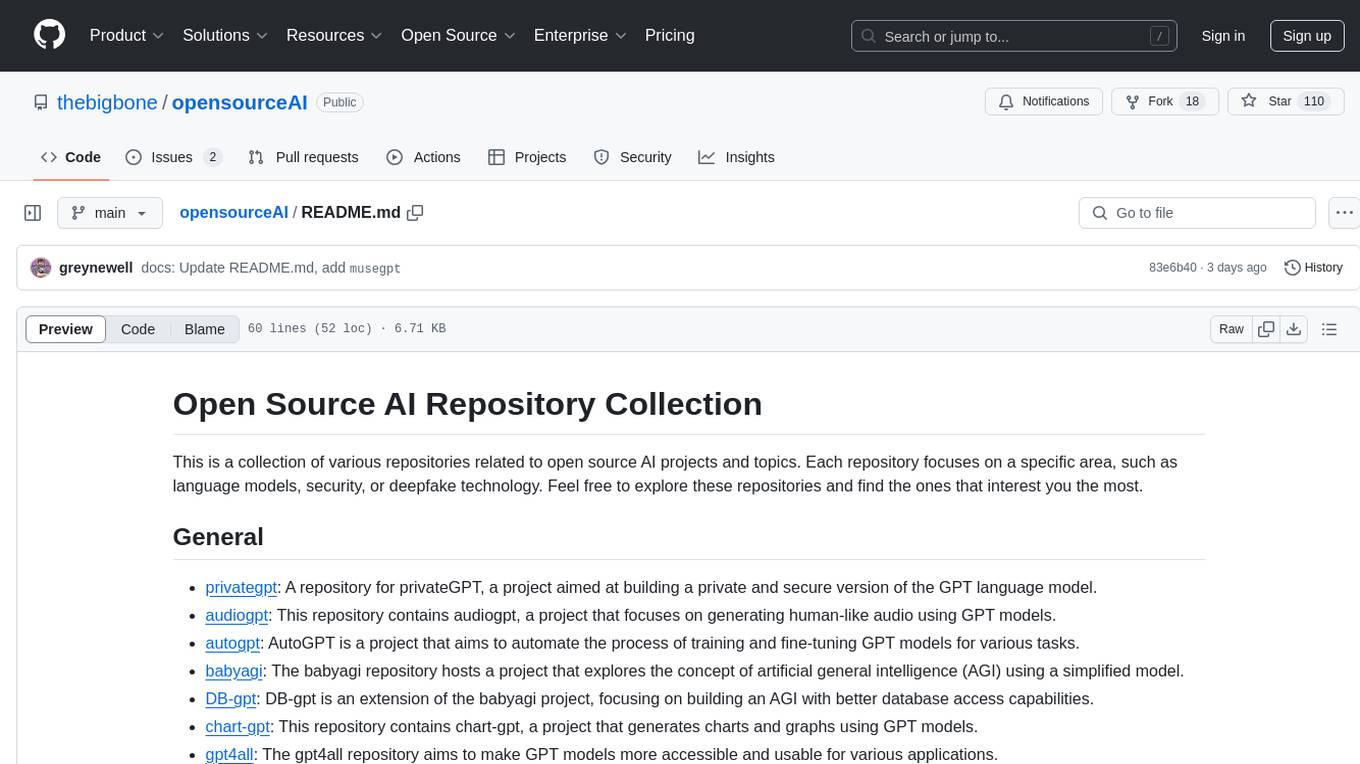
opensourceAI
This repository is a collection of various open source AI projects and topics, each focusing on specific areas such as language models, security, and deepfake technology. It includes projects like privateGPT for building a private version of the GPT language model, AutoGPT for automating training GPT models, and DeepFaceLab for deepfake creation. Explore these repositories to find projects that interest you.
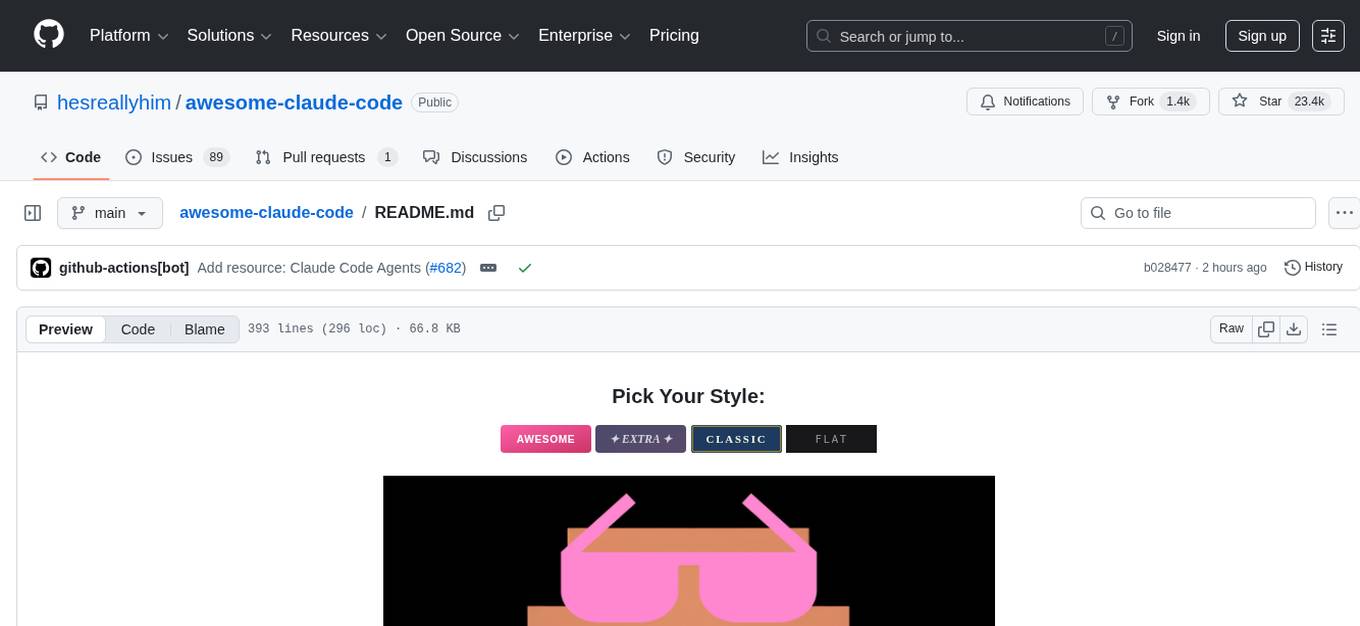
awesome-claude-code
Awesome Claude Code is a curated list of slash-commands, CLAUDE.md files, CLI tools, and other resources for enhancing your Claude Code workflow. It includes a variety of agent skills, workflows, tooling, hooks, slash-commands, and more to help developers improve their coding experience using Claude Code, a CLI-based coding assistant from Anthropic. The list covers a wide range of topics such as AI development, project management, code analysis, documentation, CI/CD, and domain-specific projects. Whether you are a beginner or an experienced developer, this repository provides valuable resources to enhance your coding skills and workflow with Claude Code.
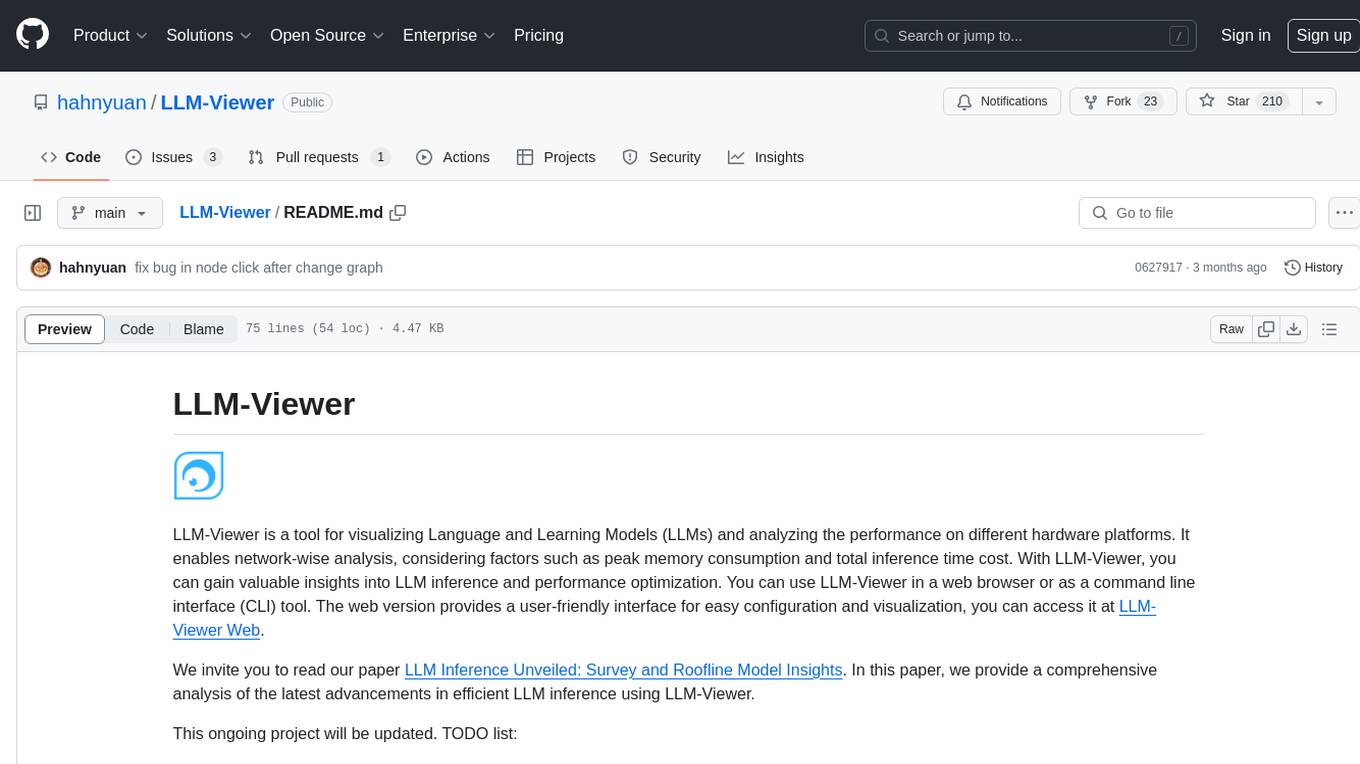
LLM-Viewer
LLM-Viewer is a tool for visualizing Language and Learning Models (LLMs) and analyzing performance on different hardware platforms. It enables network-wise analysis, considering factors such as peak memory consumption and total inference time cost. With LLM-Viewer, users can gain valuable insights into LLM inference and performance optimization. The tool can be used in a web browser or as a command line interface (CLI) for easy configuration and visualization. The ongoing project aims to enhance features like showing tensor shapes, expanding hardware platform compatibility, and supporting more LLMs with manual model graph configuration.
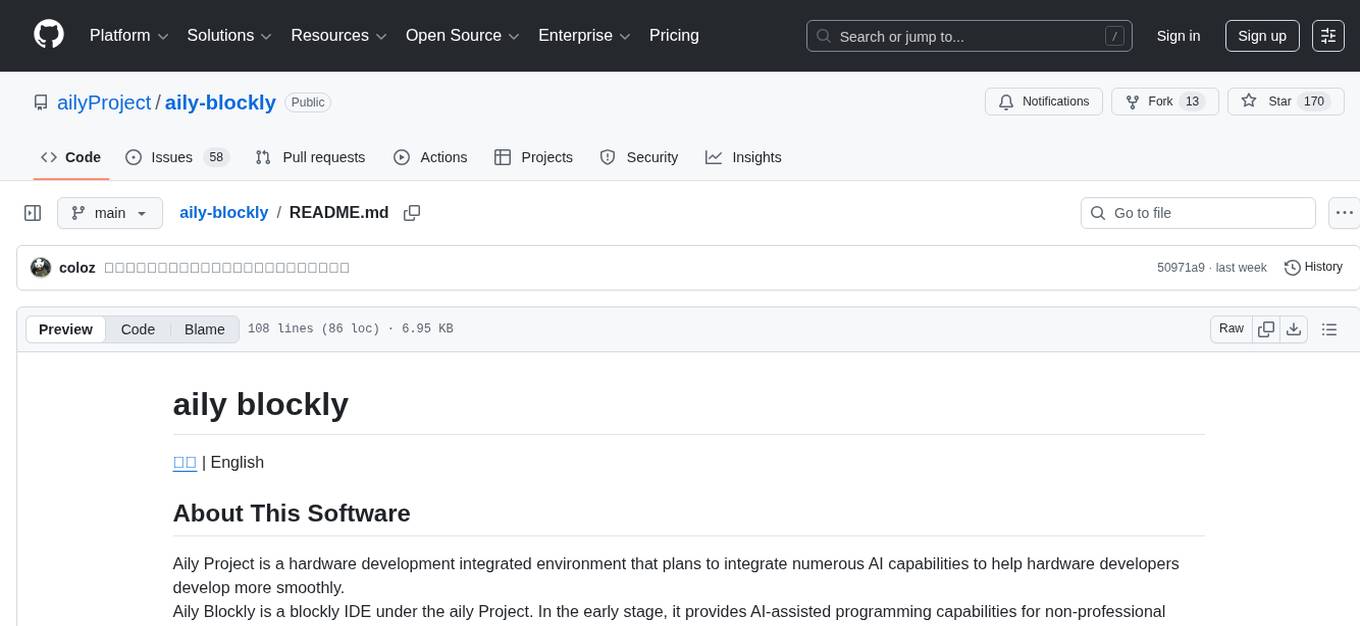
aily-blockly
Aily Blockly is a blockly IDE under the Aily Project, providing AI-assisted programming capabilities for non-professional users. It aims to integrate numerous AI capabilities to help hardware developers develop more smoothly, ultimately achieving natural language programming. The software offers features like Engineering Project Management, Library Manager, Serial Debug Tool, AI Project Generation, AI Code Generation, AI Library Conversion, Development Board Configuration Generation, and Lightning Compilation Tool. It is currently in the alpha stage, suitable for prototype verification and educational teaching.
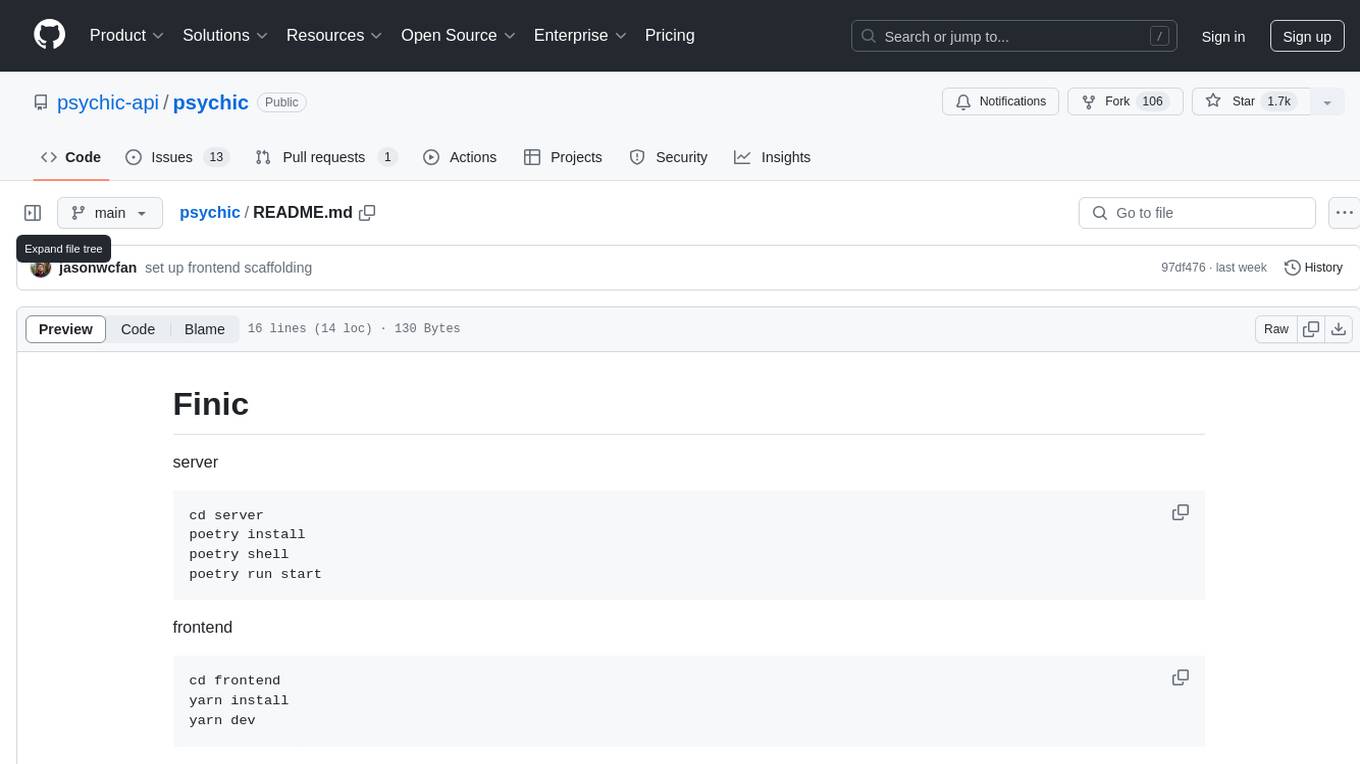
psychic
Psychic is a tool that provides a platform for users to access psychic readings and services. It offers a range of features such as tarot card readings, astrology consultations, and spiritual guidance. Users can connect with experienced psychics and receive personalized insights and advice on various aspects of their lives. The platform is designed to be user-friendly and intuitive, making it easy for users to navigate and explore the different services available. Whether you're looking for guidance on love, career, or personal growth, Psychic has you covered.
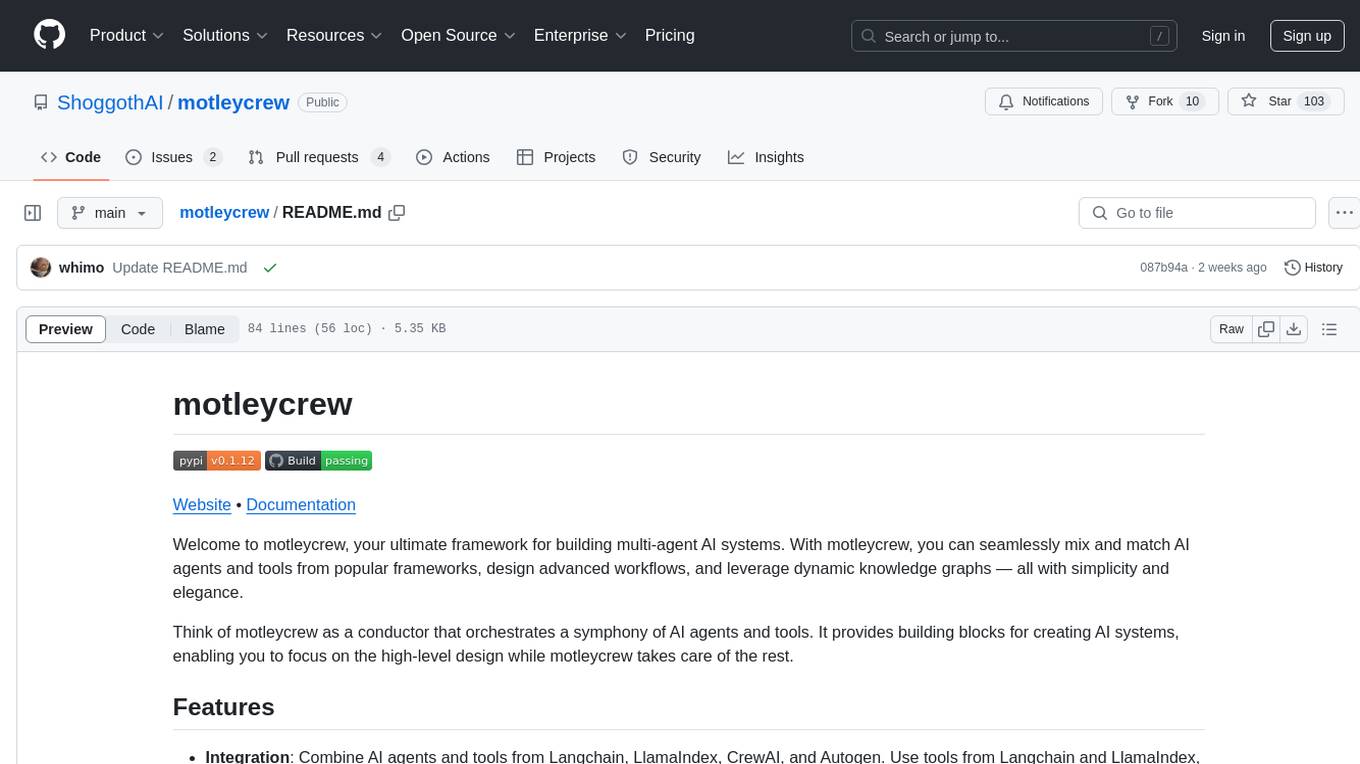
motleycrew
Motleycrew is an ultimate framework for building multi-agent AI systems, allowing users to mix and match AI agents and tools from popular frameworks, design advanced workflows, and leverage dynamic knowledge graphs with simplicity and elegance. It acts as a conductor orchestrating a symphony of AI agents and tools, providing building blocks for creating AI systems and enabling users to focus on high-level design while taking care of the rest. The framework offers integration with various tools, flexibility in providing agents with tools or other agents, advanced flow design capabilities, and built-in observability and caching features.
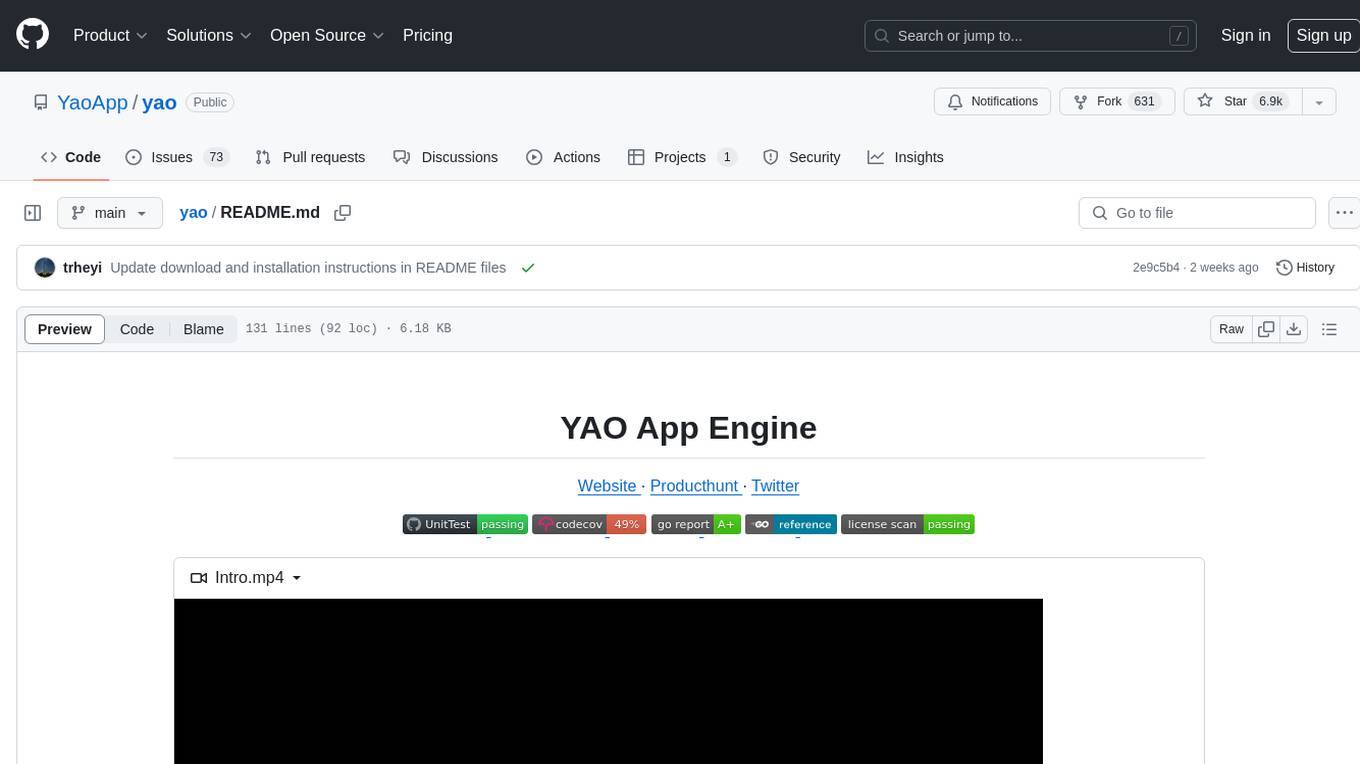
yao
YAO is an open-source application engine written in Golang, suitable for developing business systems, website/APP API, admin panel, and self-built low-code platforms. It adopts a flow-based programming model to implement functions by writing YAO DSL or using JavaScript. Yao allows developers to create web services by processes, creating a database model, writing API services, and describing dashboard interfaces just by JSON for web & hardware, and 10x productivity. It is based on the flow-based programming idea, developed in Go language, and supports multiple ways to expand the data stream processor. Yao has a built-in data management system, making it suitable for quickly making various management backgrounds, CRM, ERP, and other internal enterprise systems. It is highly versatile, efficient, and performs better than PHP, JAVA, and other languages.
For similar tasks

awesome-openvino
Awesome OpenVINO is a curated list of AI projects based on the OpenVINO toolkit, offering a rich assortment of projects, libraries, and tutorials covering various topics like model optimization, deployment, and real-world applications across industries. It serves as a valuable resource continuously updated to maximize the potential of OpenVINO in projects, featuring projects like Stable Diffusion web UI, Visioncom, FastSD CPU, OpenVINO AI Plugins for GIMP, and more.

VisionCraft
The VisionCraft API is a free API for using over 100 different AI models. From images to sound.

openvino
OpenVINO™ is an open-source toolkit for optimizing and deploying AI inference. It provides a common API to deliver inference solutions on various platforms, including CPU, GPU, NPU, and heterogeneous devices. OpenVINO™ supports pre-trained models from Open Model Zoo and popular frameworks like TensorFlow, PyTorch, and ONNX. Key components of OpenVINO™ include the OpenVINO™ Runtime, plugins for different hardware devices, frontends for reading models from native framework formats, and the OpenVINO Model Converter (OVC) for adjusting models for optimal execution on target devices.
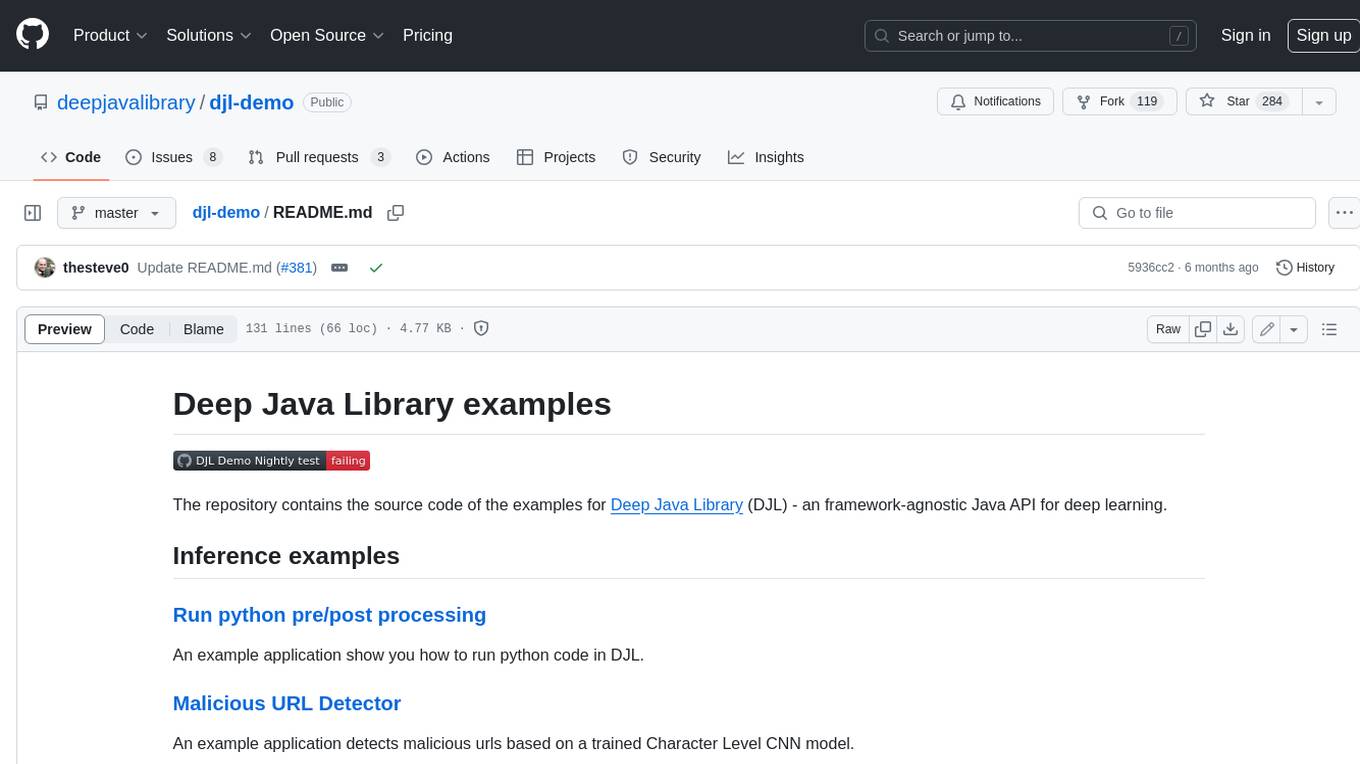
djl-demo
The Deep Java Library (DJL) is a framework-agnostic Java API for deep learning. It provides a unified interface to popular deep learning frameworks such as TensorFlow, PyTorch, and MXNet. DJL makes it easy to develop deep learning applications in Java, and it can be used for a variety of tasks, including image classification, object detection, natural language processing, and speech recognition.
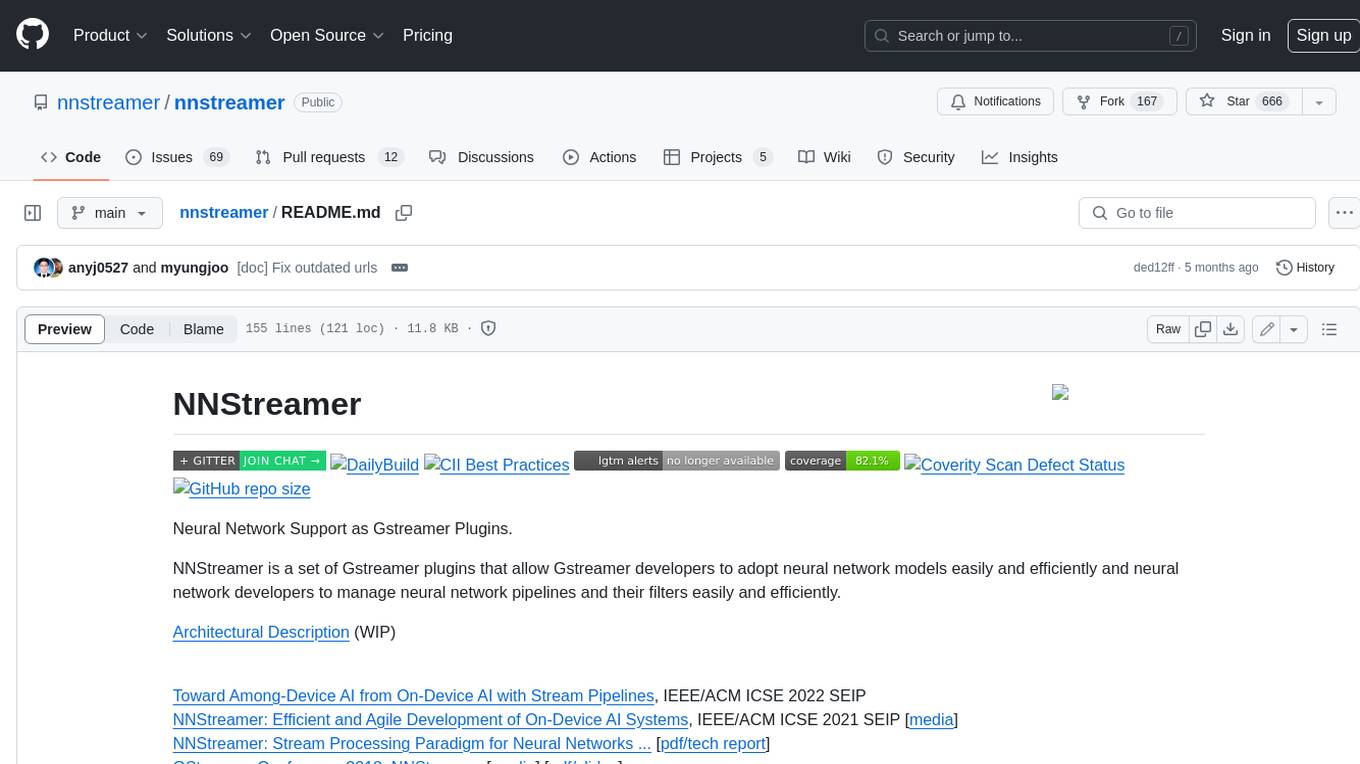
nnstreamer
NNStreamer is a set of Gstreamer plugins that allow Gstreamer developers to adopt neural network models easily and efficiently and neural network developers to manage neural network pipelines and their filters easily and efficiently.
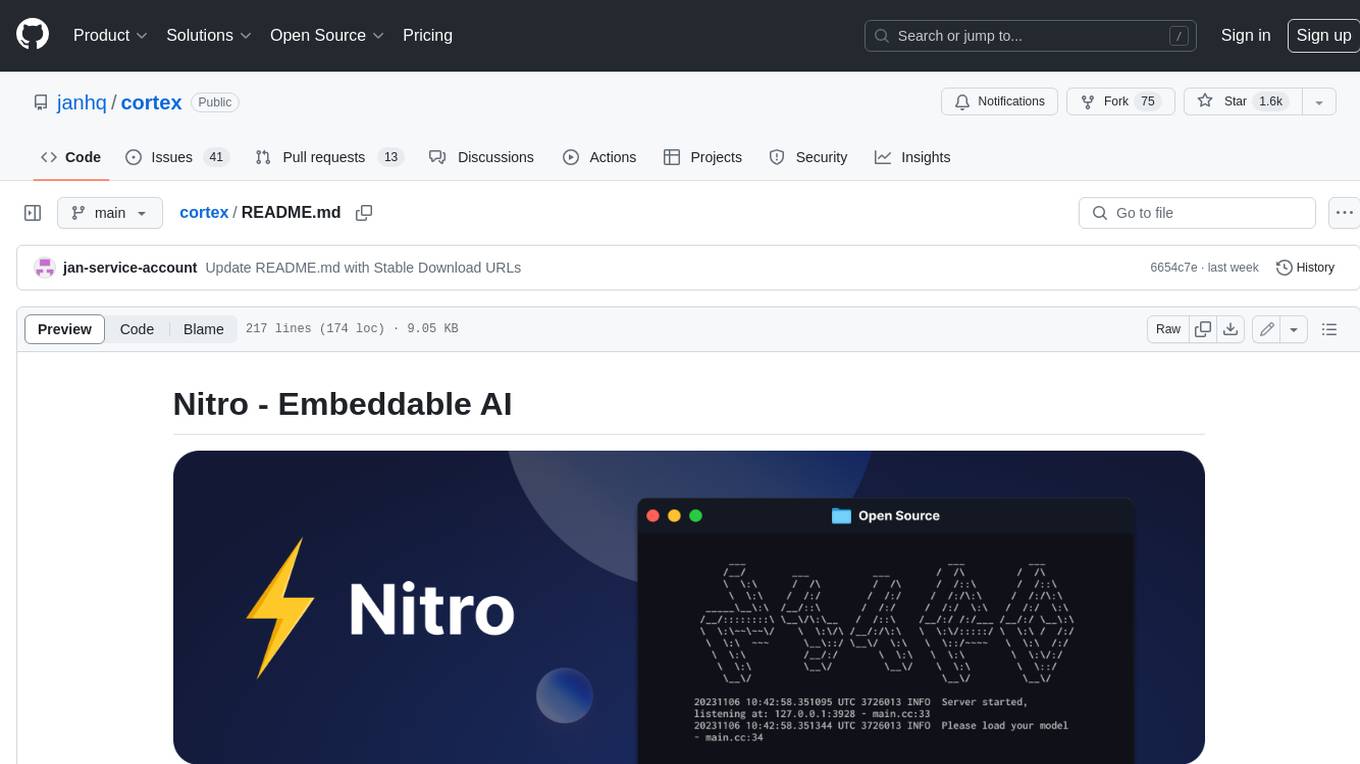
cortex
Nitro is a high-efficiency C++ inference engine for edge computing, powering Jan. It is lightweight and embeddable, ideal for product integration. The binary of nitro after zipped is only ~3mb in size with none to minimal dependencies (if you use a GPU need CUDA for example) make it desirable for any edge/server deployment.
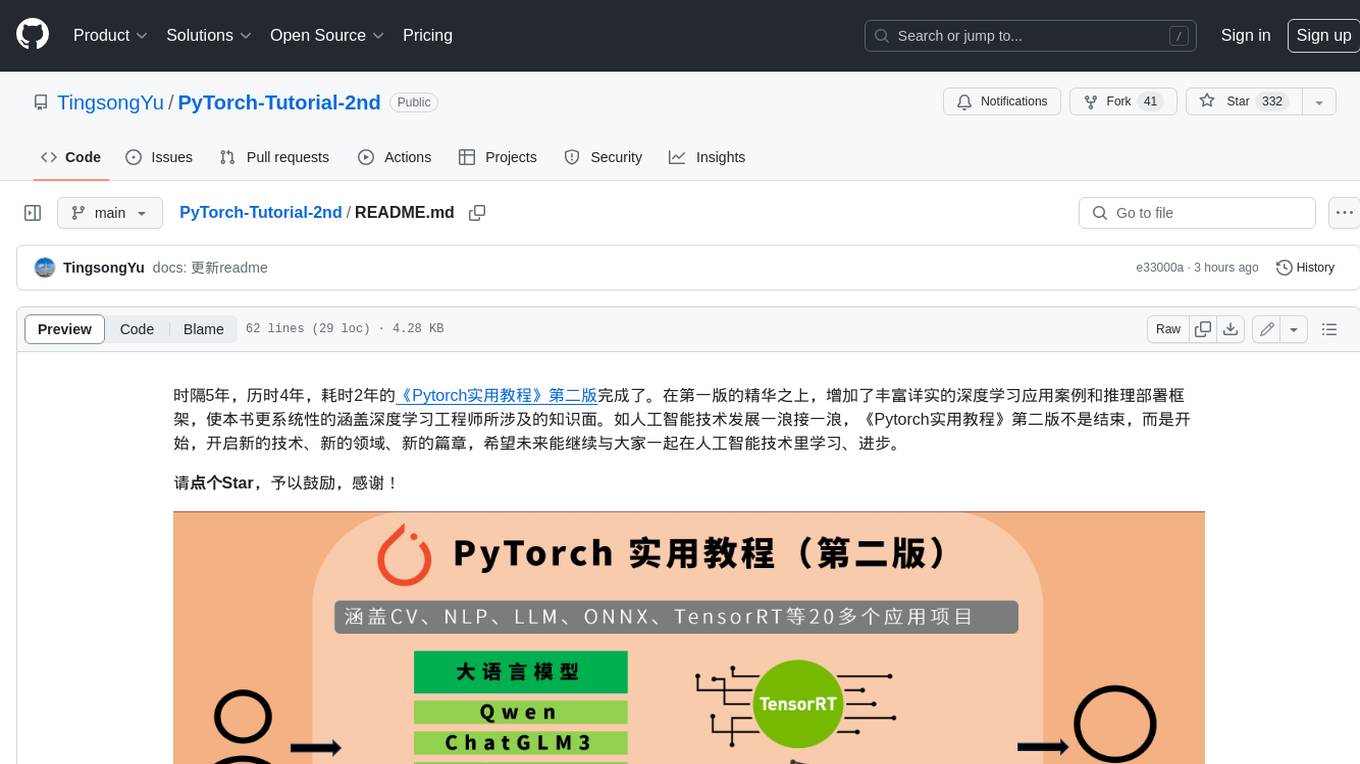
PyTorch-Tutorial-2nd
The second edition of "PyTorch Practical Tutorial" was completed after 5 years, 4 years, and 2 years. On the basis of the essence of the first edition, rich and detailed deep learning application cases and reasoning deployment frameworks have been added, so that this book can more systematically cover the knowledge involved in deep learning engineers. As the development of artificial intelligence technology continues to emerge, the second edition of "PyTorch Practical Tutorial" is not the end, but the beginning, opening up new technologies, new fields, and new chapters. I hope to continue learning and making progress in artificial intelligence technology with you in the future.
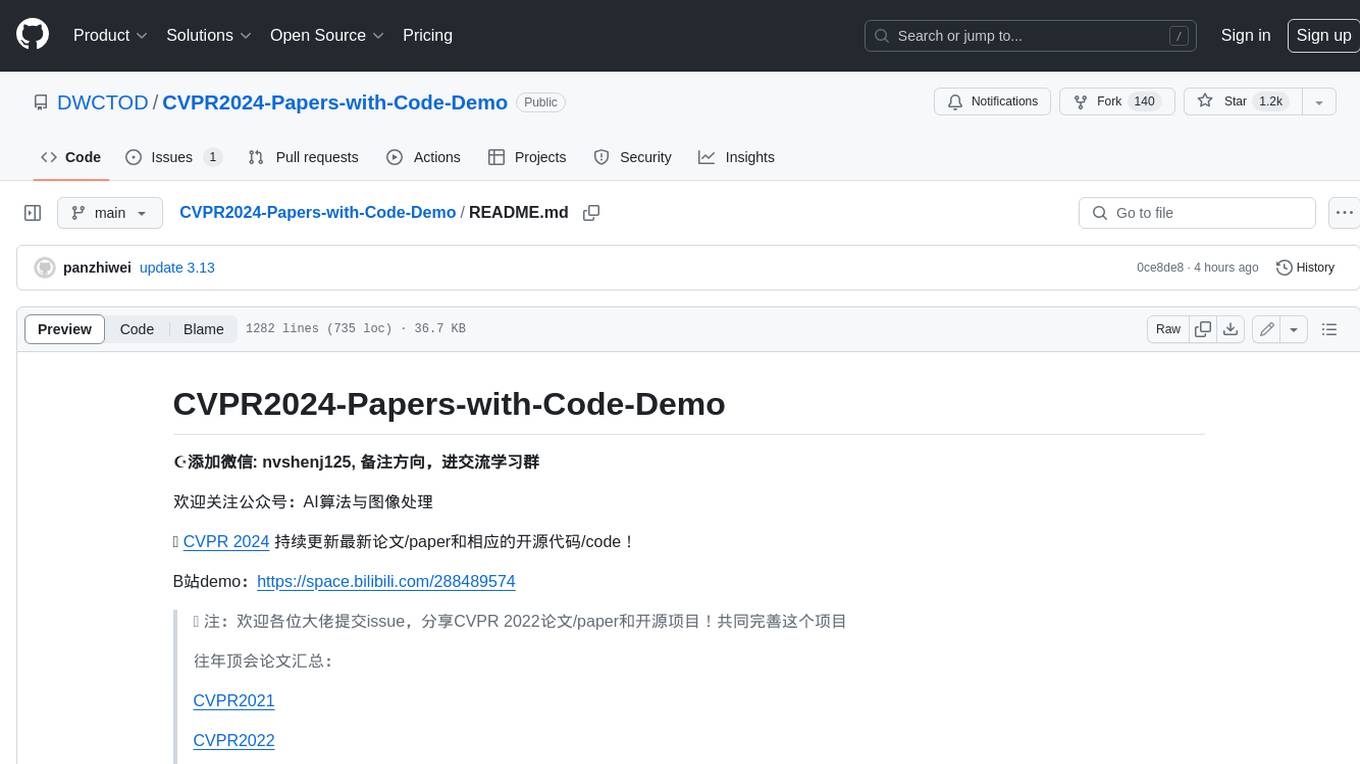
CVPR2024-Papers-with-Code-Demo
This repository contains a collection of papers and code for the CVPR 2024 conference. The papers cover a wide range of topics in computer vision, including object detection, image segmentation, image generation, and video analysis. The code provides implementations of the algorithms described in the papers, making it easy for researchers and practitioners to reproduce the results and build upon the work of others. The repository is maintained by a team of researchers at the University of California, Berkeley.
For similar jobs

sweep
Sweep is an AI junior developer that turns bugs and feature requests into code changes. It automatically handles developer experience improvements like adding type hints and improving test coverage.

teams-ai
The Teams AI Library is a software development kit (SDK) that helps developers create bots that can interact with Teams and Microsoft 365 applications. It is built on top of the Bot Framework SDK and simplifies the process of developing bots that interact with Teams' artificial intelligence capabilities. The SDK is available for JavaScript/TypeScript, .NET, and Python.

ai-guide
This guide is dedicated to Large Language Models (LLMs) that you can run on your home computer. It assumes your PC is a lower-end, non-gaming setup.

classifai
Supercharge WordPress Content Workflows and Engagement with Artificial Intelligence. Tap into leading cloud-based services like OpenAI, Microsoft Azure AI, Google Gemini and IBM Watson to augment your WordPress-powered websites. Publish content faster while improving SEO performance and increasing audience engagement. ClassifAI integrates Artificial Intelligence and Machine Learning technologies to lighten your workload and eliminate tedious tasks, giving you more time to create original content that matters.

chatbot-ui
Chatbot UI is an open-source AI chat app that allows users to create and deploy their own AI chatbots. It is easy to use and can be customized to fit any need. Chatbot UI is perfect for businesses, developers, and anyone who wants to create a chatbot.

BricksLLM
BricksLLM is a cloud native AI gateway written in Go. Currently, it provides native support for OpenAI, Anthropic, Azure OpenAI and vLLM. BricksLLM aims to provide enterprise level infrastructure that can power any LLM production use cases. Here are some use cases for BricksLLM: * Set LLM usage limits for users on different pricing tiers * Track LLM usage on a per user and per organization basis * Block or redact requests containing PIIs * Improve LLM reliability with failovers, retries and caching * Distribute API keys with rate limits and cost limits for internal development/production use cases * Distribute API keys with rate limits and cost limits for students

uAgents
uAgents is a Python library developed by Fetch.ai that allows for the creation of autonomous AI agents. These agents can perform various tasks on a schedule or take action on various events. uAgents are easy to create and manage, and they are connected to a fast-growing network of other uAgents. They are also secure, with cryptographically secured messages and wallets.

griptape
Griptape is a modular Python framework for building AI-powered applications that securely connect to your enterprise data and APIs. It offers developers the ability to maintain control and flexibility at every step. Griptape's core components include Structures (Agents, Pipelines, and Workflows), Tasks, Tools, Memory (Conversation Memory, Task Memory, and Meta Memory), Drivers (Prompt and Embedding Drivers, Vector Store Drivers, Image Generation Drivers, Image Query Drivers, SQL Drivers, Web Scraper Drivers, and Conversation Memory Drivers), Engines (Query Engines, Extraction Engines, Summary Engines, Image Generation Engines, and Image Query Engines), and additional components (Rulesets, Loaders, Artifacts, Chunkers, and Tokenizers). Griptape enables developers to create AI-powered applications with ease and efficiency.
